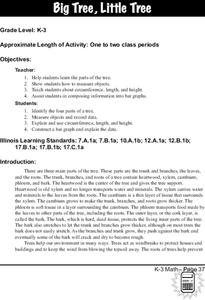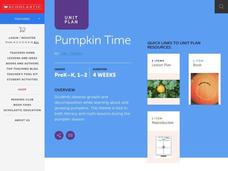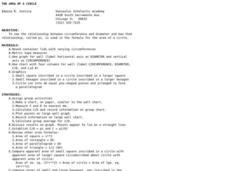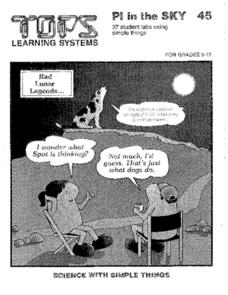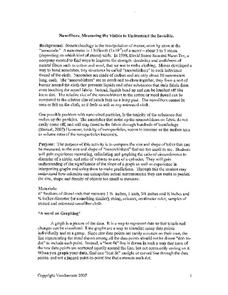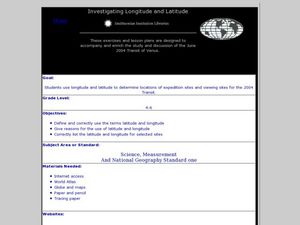Curated OER
Parachutes, Circles and Pi...Oh My!
Students explore different size circles to discover the relationship between diameter and circumference. In this circles and Pi lesson, students construct simple parachutes using circle patterns of varying sizes. Students predict the...
Curated OER
Small Angle Calculations
Students work with circles, angles and estimating angles in the night sky. For this circles and angles lesson, students practice measuring a degree using the circumference of a circle and apply the degree to determine a way to use their...
Curated OER
Are You Full of Hot Air?
Explore the concept of measuring and recording circumference. In this physical science and measurement lesson, young learners blow up balloons, measure the circumference, and record the data on an interactive graphing website.
Curated OER
Circular Motion
A helpful physics presentation will have you talking in circles! The material covers circular motion, and includes diagrams, formulas, and example problems. When used in addition with directed instruction and a teacher-created form...
Curated OER
Trees
Learners investigate the parts of a tree, measure its circumference and the length and width of its longest branch. The data is compiled and placed into a bar graph.
Curated OER
Pumpkin Time
In these two lessons, science learners participate in various activities involving pumpkins. They investigate and research the life cycle of a pumpkin. They observe pumpkin growth and decomposition. Finally, they estimate and measure...
Curated OER
Measuring the Earth
Students use principles of geometry to measure the circumference of the Earth. In this applied geometry lesson, students use mathematics to determine scientific information. They make measurements, calculate the central angle, and...
Curated OER
Geometry in Nature
Students examine how the circumference, diameter, and the relationship of Pi of a circle are related. They count the summer rings of a tree to determine its growth.
Curated OER
Our Solar System - Comparing Planetary Travel Distances
NASA presents a mini-unit on distances in our solar system. It incorporates scientific concepts of gravity, mass, density, and payload while your aspiring astronauts also employ mathematics skills. They calculate speed, they determine...
Curated OER
How Big is Barbie?
Learners measure various dimensions of a male and a female dolls body and scale them proportionally to average human measurements. They calculate the appropriate scale factor (magnitude) to enlarge their doll and apply that scale factor...
Teach Engineering
The Great Gravity Escape
Groups simulate an orbit using a piece of string and a water balloon. Individuals spin in a circular path and calculate the balloon's velocity when the clothes pin can no longer hold onto the balloon.
National Wildlife Federation
What is DBH?
When measuring the circumference of a tree, does it matter how high you place the measuring tape? Most scholars have never considered this question, but scientists know that measurement techniques must be standardized. The 13th lesson in...
Curated OER
THE AREA OF A CIRCLE
Students examine the relationship between circumference and diameter and how to use the formula to find the area of a circle. In this circle lesson plan students divide into groups and complete an activity.
Curated OER
Round and Round--Wheels and Axles
In this wheels and axles worksheet, students read a 1 page article, make a list of how many objects they can find or think if that uses a wheel or axle and then design their own machine.
Curated OER
Density of the Human Body
In this density of the human body worksheet, learners measure several parts of the body to calculate the body volume. Students convert the body volume to body mass and body density.
TOPS Learning Systems
PI in the SKY
What is pi anyway? After this set of activities, your pupils should have multiple answers to this question. Investigate pi with various experiments and discoveries. Calculate the ratio circumference/diameter for different sized...
Curated OER
Planetary Orbit
Students compare and contrast ellipses of various eccentricities that represent the shape of planetary orbits. They make a circle with the string by trying the two ends togther. Students calculate the eccentricity of their ellipses by...
Curated OER
Creating a Basal Area Measuring Tape
Students use formulas to design and create a table. In this calculations lesson students create basal measuring tapes that will be used to measure woodlot stocking levels.
Curated OER
Nanofibers: Measuring the Visible to Understand the Invisible
Learners compare the size and shape of tubes that can be measured, to the size and shape of "nanowhiskers" that are too small to see. They practice measuring, calculating and graphing the ratio of circumference to diameter of a circle,...
Alabama Learning Exchange
How Big Can a Bee Be?
Mathematicians analyze the relationships between surface area and volume. They conduct Internet research, conduct various experiments, record the data in a spreadsheet, and graph the results and compare the rate of increase of surface...
LABScI
Cell Diffusion and Permeability: The See-Thru Egg Lab
Create a model to study a microscopic phenomenon. The seventh of 12 lessons uses an egg (without its shell) to represent a cell membrane. Using different solutions, learners explore the concept of cell diffusion. They monitor...
Curated OER
Flight Paths of Orbiting Satellites
Students examine the path a satellite follows as it orbits the earth. For this space science lesson, students use a globe as they illustrate a satellite in its orbital plane, then plot points on the satellite's path on the globe to see...
Curated OER
Investigating Latitude and Longitude
Students examine the lines of latitude and longitude on a map, and explain why these lines might be useful. In this lesson plan students also explore websites that provide information to improve their understanding of how and why...
Curated OER
Minerals
Young scholars explore the concept of minerals. In this minerals lesson, students discuss how cooling affects the size of crystals. Young scholars discuss how the structure of minerals is a tetrahedron. Students discuss the structure of...




